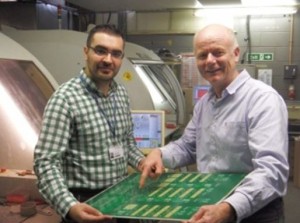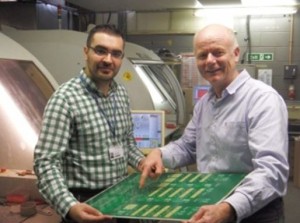
A New Approach to Medical Diagnostics Using PCBs.
 Newbury Electronics has been appointed as the manufacturing partner on a new research project which is being funded by a £1 million grant, awarded by the EPSRC (Engineering and Physical Sciences Research Council), for manufacturing low-cost, disposable, point-of-care, diagnostic devices. Working with Dr Themis Prodromakis, Reader in Nanoelectronics within the Nano Research Group of Electronics and Computer Science at University of Southampton, and researchers in The Dept of Infection and Immunity of Imperial College Healthcare NHS, Newbury Electronics will bring their extensive knowledge of manufacturing techniques and materials to this innovative work.
Newbury Electronics has been appointed as the manufacturing partner on a new research project which is being funded by a £1 million grant, awarded by the EPSRC (Engineering and Physical Sciences Research Council), for manufacturing low-cost, disposable, point-of-care, diagnostic devices. Working with Dr Themis Prodromakis, Reader in Nanoelectronics within the Nano Research Group of Electronics and Computer Science at University of Southampton, and researchers in The Dept of Infection and Immunity of Imperial College Healthcare NHS, Newbury Electronics will bring their extensive knowledge of manufacturing techniques and materials to this innovative work.
Philip King, director at Newbury Electronics said; "We are delighted to have been appointed as the manufacturing partner for this project. Themis and his team have come up with an exciting alternative to more traditional diagnostic methods and it is now our job, as the expert manufacturers, to help transform this idea into a feasible product. The inclusion of Imperial College as the clinicians to demonstrate the relevance of this research ensures that valid input from all sides is incorporated right from the initial stages."
Dr Themis Prodromakis' project is looking at manufacturing low-cost, real-time diagnostics that leverages hybrid platforms comprising sensing electrodes on PCBs and discrete active components as the transducers.
Imperial College NHS is highly interested in this research as they believe this could replace the conventional enzyme-linked immunosorbent assay (ELISA), which is the golden standard in diagnostics. The team has already committed to carry out all clinical trials throughout this three year project.
"A project of this nature is the perfect illustration of how academia, manufacturing and the end user can come to together to pool their knowledge and experience to make a real and valuable change;" said Dr Prodromakis. "I have worked with Newbury Electronics in the past and believe that their input will be vital in initial development but also longer term when we are hoping to be able to produce a viable product to take to market. There is a real opportunity for this new diagnostic tool to make a tangible difference to healthcare not only in the UK but in international markets as well."
The first stage is well underway and researchers are spending time with Philip and his team gaining a better understanding of the PCB manufacturing process and how this can be refined and amended to use alternative materials and to finer degrees of accuracy. If the development work goes to plan the first prototypes should be available for initial testing by next year.
This is not the first time that Newbury Electronics has worked in conjunction with a research application. "A project like this has a numerous benefits for us a company aside from the prestige. We will inevitably learn new methods and techniques which we enable us to enhance our entire offering so all our customers will benefit in the long term. Working at the leading-edge of a new development also puts us in a great position to maximise on any commercial opportunities that might arise in the future as a result of this work. Finally, it is yet another great example of British manufacturing recognising both the challenge and opportunities that are available in the 21st century and we want other UK companies to recognise and engage with the skills and expertise that exists."

